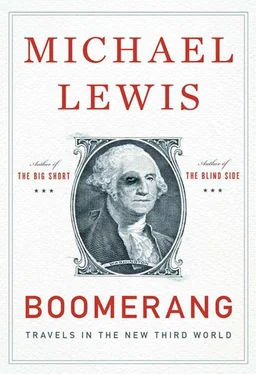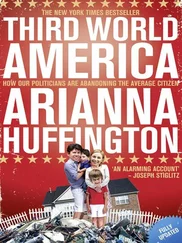When Neil Armstrong took his small step from Apollo 11 and looked around, he probably thought, Wow, sort of like Iceland—even though the moon was nothing like Iceland. But then, he was a tourist, and a tourist can’t help but have a distorted opinion of a place: he meets unrepresentative people, has unrepresentative experiences, and runs around imposing upon the place the fantastic mental pictures he had in his head when he got there. When Iceland became a tourist in global high finance it had the same problem as Neil Armstrong. Icelanders are among the most inbred human beings on earth—geneticists often use them for research. They inhabited their remote island for 1,100 years without so much as dabbling in leveraged buyouts (LBOs), hostile takeovers, derivatives trading, or even small-scale financial fraud. When, in 2003, they sat down at the same table with Goldman Sachs and Morgan Stanley, they had only the roughest idea of what an investment banker did and how he behaved—most of it gleaned from young Icelanders’ experiences at various American business schools. And so what they did with money probably says as much about the American soul, circa 2003, as it does about Icelanders. They understood instantly, for instance, that finance had less to do with productive enterprise than trading bits of paper among themselves. And when they lent money they didn’t simply facilitate enterprise but bankrolled friends and family, so that they might buy and own things, like real investment bankers: Beverly Hills condos, British soccer teams and department stores, Danish airlines and media companies, Norwegian banks, Indian power plants.
That was the biggest American financial lesson the Icelanders took to heart: the importance of buying as many assets as possible with borrowed money, as asset prices only rose. By 2007, Icelanders owned roughly fifty times more foreign assets than they had in 2002. They bought private jets and third homes, in London and Copenhagen. They paid vast sums of money for services no one in Iceland had theretofore ever imagined wanting. “A guy had a birthday party, and he flew in Elton John for a million dollars to sing two songs,” the head of the Left-Green Movement, Steingrimur Sigfússon, tells me with fresh incredulity. “And apparently not very well.” They bought stakes in businesses they knew nothing about and told the people running them what to do—just like real American investment bankers! For instance, an investment company called FL Group—a major shareholder in Glitnir bank—bought an 8.25 percent stake in American Airlines’ parent corporation. No one inside FL Group had ever actually run an airline; no one in FL Group even had meaningful work experience at an airline. That didn’t stop FL Group from telling American Airlines how to run an airline. “After taking a close look at the company over an extended period of time,” FL Group CEO Hannes Smárason, a graduate of MIT’s Sloan School, got himself quoted saying, in his press release, not long after he bought his shares, “our suggestions include monetizing assets . . . that can be used to reduce debt or return capital to shareholders.”
Nor were the Icelanders particularly choosy about what they bought. I spoke with a hedge fund in New York that, in late 2006, spotted what it took to be an easy mark: a weak Scandinavian bank getting weaker. It established a short position, and then, out of nowhere, came Kaupthing to take a 10 percent stake in this soon to be defunct enterprise, driving up the share price to absurd levels. I spoke to another hedge fund in London so perplexed by the many bad LBOs Icelandic banks were financing that it hired private investigators to figure out what was going on in the Icelandic financial system. The investigators produced a chart detailing a byzantine web of interlinked entities that boiled down to this: a handful of guys in Iceland who had no experience in finance were taking out tens of billions of dollars in short-term loans from abroad. They were then relending this money to themselves and their friends to buy assets—the banks, soccer teams, etc. Since the entire world’s assets were rising—thanks in part to people like these Icelandic lunatics paying crazy prices for them—they appeared to be making money. Yet another hedge fund manager explained Icelandic banking to me this way: you have a dog, and I have a cat. We agree that each is worth a billion dollars. You sell me the dog for a billion, and I sell you the cat for a billion. Now we are no longer pet owners but Icelandic banks, with a billion dollars in new assets. “They created fake capital by trading assets amongst themselves at inflated values,” says a London hedge fund manager. “This was how the banks and investment companies grew and grew. But they were lightweights in the international markets.”
ON FEBUARY 3, Tony Shearer, the former CEO of a British merchant bank called Singer & Friedlander, offered a glimpse of the inside when he appeared before a House of Commons committee to describe his bizarre experience of being acquired by an Icelandic bank.
Singer & Friedlander had been around since 1907 and was famous for, among other things, giving George Soros his start. In November 2003, Shearer learned that Kaupthing, of whose existence he was totally unaware, had just taken a 9.5 percent stake in his bank. Normally, when a bank tries to buy another bank, it seeks to learn something about it. Shearer offered to meet with Kaupthing’s chairman, Sigurdur Einarsson; Einarsson had no interest. When Kaupthing raised its stake to 19.5 percent, Shearer finally flew to Reykjavík to see who on earth these Icelanders were. “They were very different,” he told the House of Commons committee. “They ran their business in a very strange way. Everyone there was incredibly young. They were all from the same community in Reykjavík. And they had no idea what they were doing.”
He examined Kaupthing’s annual reports and discovered some amazing facts: this giant international bank had only one board member who was not Icelandic, for instance. Its directors all had four-year contracts, and the bank had lent them £19 million to buy shares in Kaupthing, along with options to sell those shares back to the bank at a guaranteed profit. Virtually the entire bank’s stated profits were caused by its marking up assets it had bought at inflated prices. “The actual amount of profits that were coming from what I’d call banking was less than 10 percent,” said Shearer.
In a sane world the British regulators would have stopped the new Icelandic financiers from devouring the ancient British merchant bank. Instead, the regulators ignored a letter Shearer wrote to them. A year later, in January 2005, he received a phone call from the British takeover panel. “They wanted to know,” says Shearer, “why our share price had risen so rapidly over the past couple of days. So I laughed and said, ‘I think you’ll find the reason is that Mr. Einarsson, the chairman of Kaupthing, said two days ago, like an idiot, that he was going to make a bid for Singer & Friedlander.’” In August 2005, Singer & Friedlander became Kaupthing Singer & Friedlander, and Shearer quit, he says, out of fear of what might happen to his reputation if he stayed. Sure enough, in October 2008, Kaupthing Singer & Friedlander went bust.
In spite of all this, when Tony Shearer was pressed by the House of Commons to characterize the Icelanders as mere street hustlers, he refused. “They were all highly educated people,” he said in a tone of amazement.
HERE IS YET another way in which Iceland echoed the American model: all sorts of people, none of them Icelandic, tried to tell them they had a problem. In early 2006, for instance, an analyst named Lars Christensen and three of his colleagues at Denmark’s biggest bank, Danske Bank, wrote a report that said Iceland’s financial system was growing at a mad pace and was on a collision course with disaster. “We actually wrote the report because we were worried our clients were getting too interested in Iceland,” he tells me. “Iceland was the most extreme of everything.” Christensen then flew to Iceland and gave a speech to reinforce his point, only to be greeted with anger. “The Icelandic banks took it personally,” he says. “We were being threatened with lawsuits. I was told, ‘You’re Danish, and you are angry with Iceland because Iceland is doing so well.’ Basically it all had to do with what happened in 1944,” when Iceland declared its independence from Denmark. “The reaction wasn’t, ‘These guys might be right.’ It was, ‘No! It’s a conspiracy. They have bad motives.’” The Danish were just jealous!
Читать дальше












